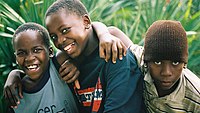
Photo from wikipedia
ABSTRACT Background United States (U.S.) census data from 2017 indicates that the percentage of persons born outside of the U.S. is increasing. However, no studies describe the amount of class… Click to show full abstract
ABSTRACT Background United States (U.S.) census data from 2017 indicates that the percentage of persons born outside of the U.S. is increasing. However, no studies describe the amount of class time focused on immigrant and refugee health during medical school in the U.S. nor on incoming residents’ confidence in providing culturally sensitive care. The objective of this study is to characterize final-year medical students’ exposure to immigrant and refugee health and their confidence in caring for these populations. Methods A voluntary, cross-sectional survey was sent electronically to fourth-year medical students at twelve U.S. medical schools in 2020, with 707 respondents (46% response rate). Questions addressed respondents’ curricular exposure to immigrant and refugee health care during medical school and their confidence in providing culturally sensitive care. Chi-square tests were used to assess relationships between categorical variables, and odds ratios were calculated for dichotomized variables. Results Most students (70.6%) described insufficient class time dedicated to culturally sensitive care, and many (64.5%) reported insufficient clinical exposure in caring for immigrants/refugees. The odds that incoming residents felt ‘usually’ or ‘always’ confident in their ability to provide culturally sensitive care to immigrants and refugees were higher in those with more class time on culturally sensitive care (OR 5.2 [3.6–7.4]), those with more clinical opportunities to care for immigrants and refugees (OR 7.2 [5.1–10.2]), and those who participated in a domestic low-resource or international elective (OR 1.4 [1.02–1.9]). More than half (55.3%) of respondents reported feeling ‘not at all’ or only ‘sometimes’ confident in their ability to provide culturally sensitive care to immigrants/refugees. Conclusions Most fourth-year U.S. medical students entering residency feel unprepared to deliver culturally sensitive care to immigrants and refugees. This may be mediated by increased exposure to didactic curricula class time and/or experiential clinical activities, as those factors are associated with improved student confidence
Journal Title: Medical Education Online
Year Published: 2023
Link to full text (if available)
Share on Social Media: Sign Up to like & get
recommendations!